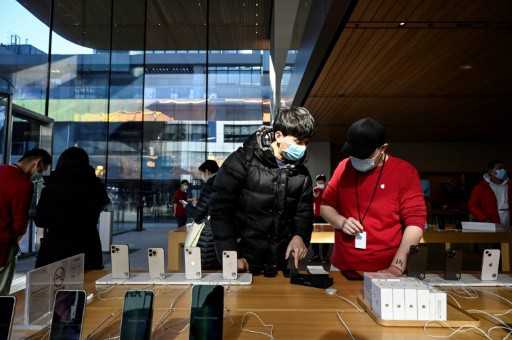Apple hits revenue record despite chip shortage

Image Collected
Apple reported record $124 billion quarterly revenue on Thursday, despite a global chip pinch and shifting impacts of the pandemic that have weighed down other big tech players. The expectations-beating results offered signals that the coronavirus-era tech boom may not be quite over yet, even as diminishing growth shadows firms like lockdown lifestyle champ Netflix.
"We set all time records for both developed and emerging markets and saw revenue growth across all of our product categories except for iPad, which we said would be supply-constrained," CEO Tim Cook told analysts. Smartphone sales topped $71 billion, buoyed by strong demand for the iPhone 13 line, especially in China.
The supply chain mess that has disrupted the making and delivery of products to consumers is not disappearing, but Apple said it expected less impact in the coming months. "There's some encouraging signs there," Cook added.
The semiconductor drought -- caused by a mix of factors including a surge in demand after the COVID-19 pandemic and virus-linked disruptions in chipmaking nations -- has affected industries across the globe from tech giants to car makers.
"It's worth noting that Apple is known for its supply-chain prowess and many wonder about the actions Apple has taken and will take to better position itself for this calendar year and to what extent these could hurt margins," said Scott Kessler from Third Bridge analysts.
Despite the volatility of the moment, Apple became the first U.S. company to hit $3 trillion in market value, briefly reaching the landmark in early January in the latest demonstration of the tech industry's pandemic power.
But tensions between the Washington and Beijing as well as the Ukraine crisis have since added to the market's jitters, with wide swings in recent days. At the same time, one-time pandemic market darlings have sunk on the prospect of diminishing growth as people are anxious to get back to something closer to pre-virus activity outside their homes.
Netflix lost tens of billions of dollars in market capitalization last week after projecting growth of just 2.5 million subscribers in the first quarter -- its slowest expansion since 2010 and a big downshift from the 55 million subscribers over the last two years as COVID-19 transformed daily life.
Yet in a sign of Apple's continuing capacity to sell a lot of handsets, it reclaimed top smartphone seller honors in China after a six-year gap, clocking a record market share in the final quarter of 2021 as U.S. sanctions hit rival Huawei.
A surge in sales saw the iPhone maker account for 23 percent of the highly competitive market in October-December, industry analysis firm Counterpoint said in a report released Wednesday. That put the U.S. giant in pole position for the first time since the final three months of 2015, toppling China's Vivo.
The App Store posted record quarterly revenue as well as Apple took in more than $19 billion from selling services and software to users of its coveted devices. Banner revenue at the App Store comes as Apple defends itself against accusations that its control over the online shop amounts to a monopoly.
However gradual steps toward in-person living won't be good for business and the company expect growth to "decelerate". "This is due to a more challenging (comparison) because a higher level of lockdowns around the world last year led to increased usage of digital content and services," CFO Luca Maestri told analysts.
Source: https://japantoday.com
Previous Story
- Tech 2022 trends: Meatless meat, Web 3.0, Big...
- Apple puts India iPhone plant 'on probation' after...
- Social media app Parler plans NFT expansion to...
- Best Laptops of 2021
- Apple tells suppliers inflation and Omicron threaten iPhone...
- APPLE CAR: THE NEXT EVOLUTION IN THE AUTOMOBILE...
- Apple offers $30 million to settle off-the-clock bag...
- Original Apple computer built by Jobs and Wozniak...